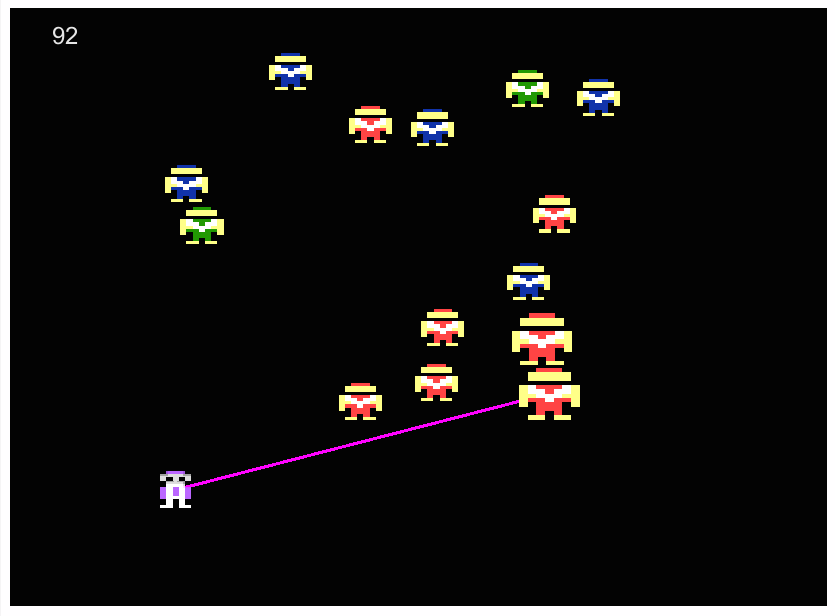Arcade classic Robotron 2084 combines game mechanics with modern day Threes ripoff 2048 in Robotron 2048. Grid-based motion, shoot-em-up and survive, and combining elements for points are at the core of this game. What started as a simple pun, is still mostly just a simple pun, but nonetheless is fun to play.
Author: Andrew Sweet
David Rosen
Rather than go in depth on any one developer, I wanted to capture more of a sense of some independent developers that inspire me and make me consider the possibility of actually creating games and releasing them to the world.
The Stanley Parable was a Half-Life 2 mod that eventually became a full-fledged product, developed by Davey Wreden. This was his first real game he made, and he made it straight out of college, it became fairly popular amongst the game-creating community, and the release version sold very well on Steam.
The Stanley Parable “Raphael Trailer” https://www.youtube.com/watch?v=AZ-IcS7mRSk
RollerCoaster Tycoon is a game that was developed by one programmer, Chris Sawyer, and one artist. For such a small development team, this is a fairly intricate simulation. It was only able to be such an advanced game at the time because developer Chris Sawyer wrote the whole game in x86 assembly language. He started his career in 1988 converting Amiga games to DOS until 1993. He released Transport Tycoon in 1994, and after four other games (two of which were Transport Tycoon World Editor/Deluxe) released RollerCoaster Tycoon. His detailed simulation fascination reminds me of Will Wright of the Sims.
The last pair that I wanted to research was Wolfire’s brother Jeff and David Rosen. From http://www.wolfire.com/ “Wolfire Games develops innovative, independent games for Mac OS, Windows, and Linux. It was started by David Rosen in 2003 to organize his open source video game contest entries. After graduating college in 2008, he was joined by his twin brother and three friends and Wolfire Games officially dove into the independent game industry!”
David Rosen has been making games in his free time for 20 years. He’s currently working on Overgrowth, which has been in development since 2008. This game is follow-up to Lugaru, a similar, much simpler version of this game. Their development has been incredibly clever and time-efficient for such a visually-detailed indie game (even if it has been in development so long). He has a GDC talk explaining his animation process, creating only 11 keyframes for any equipped item, and interpolating every possible frame of animation needed beyond that. He keeps his audience up to date with Alpha vlogs and explains his process for other developers to learn alongside him.
http://www.gdcvault.com/play/1020583/Animation-Bootcamp-An-Indie-Approach
Sample of Alpha vlog https://www.youtube.com/watch?v=HaxiKobmAR8
Jeff Rosen is the Creator of the Humble Bundle. Being connected in the independent industry with his brother allowed him to convince developers to sell on his platform. Humble has opened a whole new audience to indie games, and has opened it’s platform to include other groupings like THQ before it went under almost two years ago. It’s earned $50 million, and over $20 million of which went directly to charity.
Andrew — LTLYM: Cover of “Don’t Dream It’s Over”
Prompt: “When I was walking down the street in Liverpool I heard this guy singing that song that goes Hey now, hey now, don’t dream it’s over. He sang it really well so I asked him if I could record it in a studio and use it for a video I was making there. His name was Richie Mossman and he agreed to do it. For this assignment we ask you to do your own version of this song. It can be a faithful rendition or an interpretation, you can re-sing it, ask a choir to sing it, ask a child to sing it, sing the translation in your native tongue, with any instrumentation or with none at all….”
I can’t figure out how to embed the video. I haven’t played guitar in a while and wanted to take the chance to try playing a new song I’d never heard before.
Best Games Fest
Turtle Wushu: It felt like I’d played it before. I mean I could same about Johannes Sebastian Joust, but that game has unique elements that makes it a “new game.” Turtle Wushu felt like a low-tech Joust, and it’s hurt for that. In Turtle Wushu you’re the judge, the jury, and the executioner. Too much responsibility on your hand makes it more about the turtle than the people around you. Joust is never about the controller: I have a firm grip on it and I trust my sense of motion, so I only look at the faces of those around me and enjoy the social interaction that arises.
Unwanted Entities: As a game it was broken. We managed to rig the system to run back and forth and score points quickly. We lost because we didn’t play defensively, but our strategy + waiting in order to play more responsively/defensively would have been an easy win (we lost by 10 points, which is the smallest amount of points you can score). The game had a “surprise ending” that this game was actually about gentrification and moving the “unwanted entities” out of one neighborhood an into another. This was something I guess early on, so it had no real shock value or moral implications, but rather I was running around with sticks and placing them in chalk squares.
Mont Trottoir: How to win — start the game first, and use your avalanche second. Also I have to mention this, I was on a team with Paolo and some girl, and the girl on our team had no idea how to take big steps. This is important when you can only take two steps per turn. The game was fun and “it was a close win” but there was realistically no way for us to win. The “game master” was strict on some rules and really lax on others, making it frustrating when you don’t know which way he’ll lean. Playing cards while hopping around in a turn-based mountain climbing game was weird, it felt like that part of the game could have been better devised. Like what if each person on the expedition had real items they had to carry in a backpack, and each item represented an action you could take. Having a slightly larger commitment to the gameplay at hand would help with the mountain climbing illusion.
Bowtie Shop

In NYC where 3 Bowtie shops try to make a profit by throwing sales:
3 Bowtie shops start with $5,000 + $3,000 in the Bowtie Union Marketing Pool
Each turn store owners take a decision in Rock Paper Scissors style. Store owners can choose to have a sale (fist) or not have a sale (open hand).
There are 4 possible outcomes:
Sale in the City – one player chooses to have a sale: this store owner takes $1,000 in sales from each other store owner.
Low Prices, Low Profits – two store owners choose to have a sale: these store owners both give $1,000 in sales to the third store owner.
No Profits All Around – three store owners choose to have a sale: all store owners lose $1,000 in profit, which goes to the Bowtie Union Marketing Pool in hopes of regaining lost industry sales.
Successful, Normal Day – three store owners choose not to have a sale: the store owner with most money proposes once, without discussion, how to divide the Bowtie Union Marketing Pool. If at least one store owner agrees, the decision becomes effective. Otherwise, nobody takes anyone.
The game ends when the first store owner is out of money. The store owner with the most money wins.
Flavor Change
Rules for “Prom Queen”
In a high school where normal girls and Jennifer the popular girl exchange gossip,
Katie and Melissa want to be the prom queen. Jennifer is the head cheerleader.
The normal girls each start with 10 bits of gossip and 0 social cred points
Jennifer starts with 6 bits of gossip and 15 social creed points
Once per day, the normal girls may trade 3 bits of gossip to Jennifer for 1 social cred.
Each day, the normal girls may also plea for gossip to Jennifer after school or go home immediately.
Jennifer must give the the normal girls 2 bits of gossip if they plea, but doesn’t get anything for her generosity.
A player can become prom queen by spreading 16 bits of gossip to the student body.
If any of the girls has become prom queen and then went home without pleading for gossip, she wins.
The normal girls may exchange gossip and social cred with each other freely.
Subversive Play
Take two laptops, two keyboards, two mice, and at least one person who’s never played Portal, and you’ll have all the equipment I had for my misplayed game.
By simply plugging the keyboard and mouse into the other person’s computer, you’re now in control of what the other play sees, unable to see what actions you yourself are performing. While at the inception of my idea, I believed this would be a lot of fun, it turned out to be very frustrating and turn into instructional step-by-step exchanges in commands. It didn’t help that MacKenzie hadn’t played the game before, but the biggest frustration was probably the variation in our mouse sensitivities. Without knowing how sensitive our mice were, I over compensated to move less since he moved a lot and vice versa for him. Without an interface for feedback, one player is forced to offer feedback to the other, and feedback exchange isn’t the most exciting gameplay.
Playing the game, you feel blind and hopeless. You don’t know what you’re doing most of the time, and can only figure things out by talking or looking at each other in game. The game felt particularly anti-social as well, as the only thing you could talk about was how to correct what the other play was doing wrong, which isn’t fun for either player.
As a gameplay mechanic, I’d say this was an unfun failure; as an experiment, a success. While it didn’t provide either of us with fun, it did show me the importance of a seamless feedback loop, and how videogames can ensure players enjoy the bounds and limits of their systems without having to enforce them.


